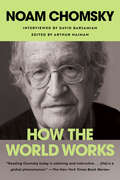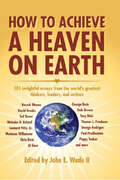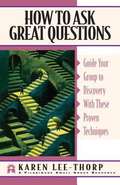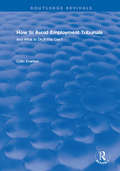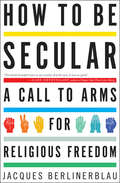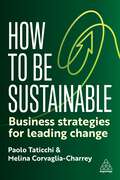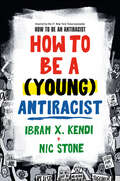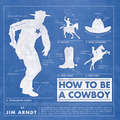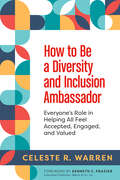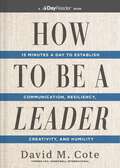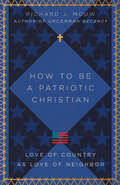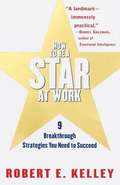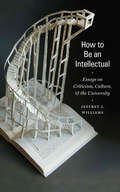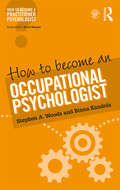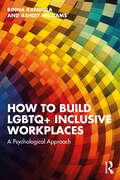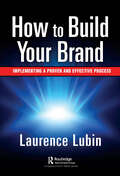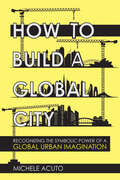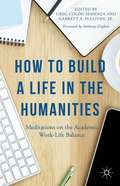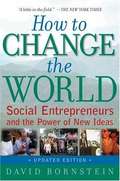- Table View
- List View
How the World Works (Real Story Ser.)
by Noam ChomskyAn eye-opening introduction to the timelessly relevant ideas of Noam Chomsky, this book is a penetrating, illusion-shattering look at how things really work"Arguably the most important intellectual alive." —The New York TimesOffering something not found anywhere else, How the World Works is pure Chomsky, but tailored for those who are new to his work. The book is made up of meticulously edited speeches and interviews, and every dazzling idea and penetrating insight is kept intact and delivered in clear, accessible, reader-friendly prose.Originally published as a series of short works—What Uncle Sam Really Wants; The Prosperous Few and the Restless Many; Secrets, Lies and Democracy; and The Common Good—these volumes together sold nearly 600,000 copies. Now collected into one comprehensive anthology, How the World Works reveals how Chomsky&’s then-revolutionary ideas have only become more relevant as time has gone by.From the concept that extreme wealth and democracy cannot exist side-by-side; to how the assumptions of mainstream media purposefully limit the spectrum of acceptable opinion; to the decline of unions and workers&’ rights thanks to corporations and their unconstrained quest for profit, Chomsky&’s prescient theories of the future—not only the future of the United States, but of the world—make it very clear that our society is paying the price now for not heeding him then.
How to Achieve a Heaven on Earth
by John E. II WadeWhether it's finding spiritual harmony, reducing carbon emissions, quelling hostilities among races, cutting taxes, or feeding the hungry, every single person has the capacity to change the world for the better. Longtime New Orleans writer, editor, and philanthropist John E. Wade II has asked some of our most prestigious thinkers, writers, artists, experts, and leaders to consider how to improve the world. The result--this ambitious volume--is as much a social mission as it is an inspirational anthology. Herein lie thoughtful and hopeful reflections on a rich variety of issues, ranging from racism, poverty, religious persecution, genocide, and environmental deterioration to individual consciousness, mental well-being, and community development.One hundred one contributions from such notable personalities as Al Gore, Tony Blair, Nicholas Kristof, Thomas L. Friedman, and George W. Bush explore variations on the themes of peace, security, freedom, democracy, prosperity, spiritual and racial harmony, ecology, health, and moral purpose and meaning. Focusing on the large problems of the world without losing sight of the little challenges people face every day, this collection of essays encourages readers to find meaning in their own lives and share it with others for the betterment of the world. Religious and secular, liberal and conservative, old and young, the luminaries who have contributed to this work offer their voices and thoughts to inspire movement toward creating a more harmonious world community.
How to Ask Great Questions: Guide Your Group to Discovery With These Proven Techniques
by Karen Lee-ThorpIdeal for small-group leaders, Sunday school teachers, and anyone who regularly leads group discussions, this book will equip you to build relationships, analyze Scripture, draw out opinions, and facilitate meetings.
How to Avoid Employment Tribunals: And What to Do If You Can't (Routledge Revivals)
by Colin EversonThis title was first published in 2002: The best way to avoid losing at an employment tribunal is to make sure that you don't get drawn into one. The author offers a practical training resource to help you understand the risks associated with employment tribunals, identify risk areas within your organization and, most important of all, provide you with the means to raise awareness amongst both managers and their employees and help them develop good people-management practice. At the heart of the resource are three compelling training case studies on unfair dismissal, racial discrimination and sexual discrimination. This resource also provides you with material to audit your current management practices and identify where and how to improve them.
How to Be Less Stupid About Race: On Racism, White Supremacy, and the Racial Divide
by Crystal Marie FlemingA unique and irreverent take on everything that's wrong with our "national conversation about race"--and what to do about itHow to Be Less Stupid About Race is your essential guide to breaking through the half-truths and ridiculous misconceptions that have thoroughly corrupted the way race is represented in the classroom, pop culture, media, and politics. Centuries after our nation was founded on genocide, settler colonialism, and slavery, many Americans are kinda-sorta-maybe waking up to the reality that our racial politics are (still) garbage. But in the midst of this reckoning, widespread denial and misunderstandings about race persist, even as white supremacy and racial injustice are more visible than ever before.Combining no-holds-barred social critique, humorous personal anecdotes, and analysis of the latest interdisciplinary scholarship on systemic racism, sociologist Crystal M. Fleming provides a fresh, accessible, and irreverent take on everything that's wrong with our "national conversation about race." Drawing upon critical race theory, as well as her own experiences as a queer black millennial college professor and researcher, Fleming unveils how systemic racism exposes us all to racial ignorance--and provides a road map for transforming our knowledge into concrete social change. Searing, sobering, and urgently needed, How to Be Less Stupid About Race is a truth bomb and call to action for everyone who wants to challenge white supremacy and intersectional oppression. If you like Issa Rae, Justin Simien, Angela Davis, and Morgan Jerkins, then this deeply relevant, bold, and incisive book is for you.
How to Be Married (Really Hard) Year of Marriage: What I Learned from Real Women on Five Continents About Surviving My First (Really Hard) Year of Marriage
by Jo PiazzaEveryone tells you marriage is hard, but no one tells you what to do about it.At age thirty-four, Jo Piazza got her romantic-comedy ending when she met the man of her dreams on a boat in the Galápagos Islands and was engaged three months later. But before long, Jo found herself riddled with questions. How do you make a marriage work in a world where you no longer need to be married? How does an independent, strong-willed feminist become someone’s partner—all the time? In the tradition of writers such as Nora Ephron and Elizabeth Gilbert, award-winning journalist and nationally bestselling author Jo Piazza writes a provocative memoir of a real first year of marriage that will forever change the way we look at matrimony. A travel editor constantly on the move, Jo journeys to twenty countries on five continents to figure out what modern marriage means. Throughout this stunning, funny, warm, and wise personal narrative, she gleans wisdom from matrilineal tribeswomen, French ladies who lunch, Orthodox Jewish moms, Swedish stay-at-home dads, polygamous warriors, and Dutch prostitutes. Written with refreshing candor, elegant prose, astute reporting, and hilarious insight into the human psyche, How to Be Married offers an honest portrait of an utterly charming couple. When life throws more at them than they ever expected—a terrifying health diagnosis, sick parents to care for, unemployment—they ultimately create a fresh understanding of what it means to be equal partners during the good and bad times. Through their journey, they reveal a framework that will help the rest of us keep our marriages strong, from engagement into the newlywed years and beyond.
How to Be Secular: A Call to Arms for Religious Freedom
by Jacques BerlinerblauWhy secularism isn&’t the same thing as atheism—and why it&’s crucial for preserving liberty and democracy for all Americans, regardless of their beliefs. Founding father Thomas Jefferson believed that &“religion is a matter which lies solely between man and his God,&” but these days many people seem to have forgotten this ideal. Conservatives claim America is a &“Christian nation&” and urge that laws be structured around religious convictions. Hardcore atheists, meanwhile, seek to undermine and attack religion at all levels. Surely there must be a middle ground. In How to Be Secular, Jacques Berlinerblau issues a call to the moderates—those who are tired of the belligerence on the fringes—that we return to America&’s long tradition of secularism, which seeks to protect both freedom from and for religion. He looks at the roots of secularism and examines how it should be bolstered and strengthened so that Americans of all stripes can live together peacefully. &“Jacques Berlinerblau mounts a careful, judicious, and compelling argument that America needs more secularists. . . . The author&’s argument merits a wide hearing and will change the way we think and talk about religious freedom.&” —Randall Balmer, author of Thy Kingdom Come: How the Religious Right Distorts FaithandThreatens America
How to Be Sustainable: Business Strategies for Leading Change
by Paolo Taticchi Melina Corvaglia-CharreyAmid the many challenges facing the world today - not least the climate crisis - the need for bold and steadfast leadership has never been greater. How to Be Sustainable uncovers the strategies that lead organizations to sustainable success. While over 90% of business leaders recognize the importance of sustainability, only 60% have a strategy in place. And many of these strategies are inefficient, ineffective, or simply don't go far enough to address the global challenges we are facing.Leading sustainability expert Paolo Taticchi and co-author Melina Corvaglia-Charrey have interviewed some of the world's leading Chief Sustainability Officers from various sectors and businesses including Enel Group, Microsoft, Canon, and Sage. Guided by expert insights and real-world examples of sustainable practices, this book explores the impact and significance of sustainability in business, offering practical strategies and tools that will allow you and your business to make a positive impact. Whether you're an experienced leader, an aspiring CSO, or passionate about sustainability, the insights shared in this book will empower and inspire you to shape a better world for future generations.
How to Be a (Young) Antiracist
by Ibram X. Kendi Nic StoneThe #1 New York Times bestseller that sparked international dialogue is now a book for young adults! Based on the adult bestseller by Ibram X. Kendi, and co-authored by bestselling author Nic Stone, How to be a (Young) Antiracist will serve as a guide for teens seeking a way forward in acknowledging, identifying, and dismantling racism and injustice. <p><p>The New York Times bestseller How to be an Antiracist by Ibram X. Kendi is shaping the way a generation thinks about race and racism. How to be a (Young) Antiracist is a dynamic reframing of the concepts shared in the adult book, with young adulthood front and center. Aimed at readers 12 and up, and co-authored by award-winning children's book author Nic Stone, How to be a (Young) Antiracist empowers teen readers to help create a more just society. Antiracism is a journey—and now young adults will have a map to carve their own path. <p><p>Kendi and Stone have revised this work to provide anecdotes and data that speaks directly to the experiences and concerns of younger readers, encouraging them to think critically and build a more equitable world in doing so. <p> <b>New York Times Bestseller</b>
How to Be a Cowboy
by Jim ArndtExplore every facet of being a cowboy with essays and colorful photos in this guide from the author of Buckaroo Boots and Art of the Buckle.How to be a Cowboy is a compendium of knowledge and insight, wit and wisdom, and all-around resource for every aspect of cowboy life. It includes the least you need to know about ranching, rodeoing, cooking, music, dancing, yodeling, lingo (like &“dude,&” &“bronc,&” and &“hoss&”), cowboy poetry, hats, boots (like boot history and how to choose a pair for yourself), spurs, shirts, horses, hats, buckles, denim, and also how to walk like a cowboy. Discover the top twenty cowboy movies and top western novels. You&’ll even find advice from cowboy icon Will Rogers.&“It&’s the rich color camerawork that really compels, and Arndt&’s classy shots of elaborately designed boots, shirts, blue jeans and hats, plus peripheral cowboy gear, are enough to make a guy chuck the 9-to-5 and head out to the wild, wild West.&”—Martin Brady, BookPage
How to Be a Diversity and Inclusion Ambassador: Everyone's Role in Helping All Feel Accepted, Engaged, and Valued
by Celeste R. WarrenUsing a proven three-part framework, this book shows how anyone-from a CEO to frontline employee-can play a pivotal role in creating a diverse and welcoming workplace.Creating a diverse workplace needs to be an ongoing effort, not just the subject of occasional training. As Celeste Warren says, needed change won't take place unless all employees feel that they have a role to play in creating the culture they would like to see in their organization. Regardless of what position you hold, you have the ability to impact change and create a more inclusive environment. Anyone can commit to becoming an unofficial Diversity and Inclusion Ambassador in his or her organization. Warren offers a straightforward three-stage model: Become aware of your strengths, weaknesses, and conscious and unconscious biases. Take an inventory of your surroundings: what is getting in the way of there being an inclusive environment in your organization? Develop a personal action plan.Depending on your position, the actions you take can be as simple as consistently raising DEI-related issues in staff meetings or as far-reaching as leading an Employee Resource Group or developing a new hiring policy. In separate chapters, Warren offers specific advice for chief diversity and inclusion officers, C-suite leaders, first-line managers, human resources practitioners, and individual contributors. This book features examples, exercises, and practical tools that show you how to assess where your organization is at and develop a purpose and strategy that can make diversity a workplace reality.
How to Be a Leader: 15 Minutes a Day to Establish Communication, Resiliency, Creativity, and Humility
by David M. CoteWhat qualities come to mind when you think about a good leader? Good listener, empathetic, good communication skills, humble, and clear expectations. Whether you're leading a small or large team, How to Be a Leader by former Honeywell CEO David Cote is a resource that will help you become the leader everyone respects and follows. 60 entries each focus on a leadership topic, highlight Cote's advice, and end with a prompt to help you build your leadership skills. How to Be a Leader will teach you how to:pursue long- and short- term goals.commit to change and the best ways to implement change.inspire others and push yourself at the same time.create alignment around company strategy.improve productivity and manage different opinions.create a diverse and connected culture.Leadership isn't about having all the answers or having control of everything. Leadership means bringing out the best in your employees, creating paths that work for your business, and building a presence that exists in small and big moments.
How to Be a Patriotic Christian: Love of Country as Love of Neighbor
by Richard J. MouwWhat does it mean to love our country?Some Christians see loyalty to America as central to our faith and identity. Other Christians are skeptical that our nation warrants such devotion or attachment. But Richard Mouw encourages Christians to have a healthy sense of national peoplehood that promotes civic kinship and responsible citizenship. He navigates between Christian nationalism on one hand and cynicism about country on the other to avoid the perils of both idolatry and disengagement.Mouw grapples with sticky questions such as how to honor national holidays in church and the place of protests in forging a more perfect union. Placing love of country in the context of Christian love of neighbor, he sees patriotism as an expression of our heavenly citizenship and a call to help our country be a place where all people can thrive in peace.Mouw's winsome and wise reflections direct our patriotic affections toward the civic good of others within our churches and in our communities. This guide helps us travel together on a shared national journey toward liberty and justice for all.
How to Be a Peaceful School: Practical Ideas, Stories and Inspiration
by Laura Roberts David Holmes Sue Webb Anna Lubelska Pali Nahal Jackie Zammit Helen Floyd Christine Easom Felicity Robinson Thérèse Hoyle Wendy Phillips Cardinal Newman Coventry Moira Thompson Isabel CartwrightPeace is needed now more than ever in schools, by pupils and teachers alike. This inspiring guide provides primary, secondary and special schools with practical methods to improve pupil and teacher wellbeing, combat bullying, and promote peace both inside and outside the school gates. The founder of the Peaceful Schools Movement, Anna Lubelska, has brought together ideas and stories from teachers and charity workers to present a simple four step system for promoting positive peace in individuals, relationships, the school community and the world. It covers how to reduce stress, promote positive mental health, resolve conflict, nurture the potential of each individual, and encourage children to develop peacemaking skills and values. This holistic resource is equally beneficial for children and staff, and transforms school environments for the better.
How to Be a Star at Work: 9 Breakthrough Strategies You Need to Succeed
by Robert E. Kelley"Do you know what it takes to be a star at work? Robert Kelley has the answer. " --Fast Company STARS ARE MADE, NOT BORN Find out what separates stars from average performers Learn how to be the top pick for the choice jobs Use nine star-performer strategies to become a member of the select "ten-for-one" club, with ten times the productivity of the average worker Find out how using the nine strategies enables you to out-perform people with supposedly better credentials New in this edition: special insights for women and members of minority groups
How to Be an Inclusive Leader: Your Role in Creating Cultures of Belonging Where Everyone Can Thrive
by Jennifer BrownWe know why diversity is important, but how do we drive real change at work? Diversity and inclusion expert Jennifer Brown provides a step-by-step guide for the personal and emotional journey we must undertake to create an inclusive workplace where everyone can thrive. Human potential is unleashed when we feel like we belong. That's why inclusive workplaces experience higher engagement, performance, and profits. But the reality is that many people still feel unable to bring their true selves to work. In a world where the talent pool is becoming increasingly diverse, it's more important than ever for leaders to truly understand how to support inclusion.Drawing on years of work with many leading organizations, Jennifer Brown shows what leaders at any level can do to spark real change. She guides readers through the Inclusive Leader Continuum, a set of four developmental stages: unaware, aware, active, and advocate. Brown describes the hallmarks of each stage, the behaviors and mind-sets that inform it, and what readers can do to keep progressing. Whether you're a powerful CEO or a new employee without direct reports, there are actions you can take that can drastically change the day-to-day reality for your colleagues and the trajectory of your organization.Anyone can—and should—be an inclusive leader. Brown lays out simple steps to help you understand your role, boost your self-awareness, take action, and become a better version of yourself in the process. This book will meet you where you are and provide a road map to create a workplace of greater mutual understanding where everyone's talents can shine.
How to Be an Intellectual: Essays on Criticism, Culture, and the University
by Jeffrey J. WilliamsOver the past decade, Jeffrey J. Williams has been one of the most perceptive observers of contemporary literary and cultural studies. He has also been a shrewd analyst of the state of American higher education. How to Be an Intellectual brings together noted and new essays and exemplifies Williams’s effort to bring criticism to a wider publicHow to Be an Intellectual profiles a number of critics, drawing on a unique series of interviews that give an inside look at their work and careers. The book often looks at critical thought from surprising angles, examining, for instance, the history of modern American criticism in terms of its keywords as they morphed from sound to rigorous to smart. It also puts in plain language the political travesty of higher education policies that produce student debt, which, as Williams demonstrates, all too readily follow the model of colonial indenture, not just as a metaphor but in actual point of fact.How to Be an Intellectual tells a story of intellectual life since the culture wars. Shedding academic obscurity and calling for a better critical writing, it reflects on what makes the critic and intellectual—the accidents of careers, the trends in thought, the institutions that shape us, and politics. It also includes personal views of living and working with books.
How to Become an Occupational Psychologist (How to become a Practitioner Psychologist)
by Stephen A. Woods Binna KandolaThe business world is increasingly aware of the value of psychology. And as organizations turn to Occupational Psychologists to help build positive, effective and healthy workplaces, so an increasing number of psychologists are choosing this fascinating area of work to make their impact as a practitioner. But how do you qualify, and what is the job really like? How to Become an Occupational Psychologist is the first book to provide an overview of the educational and professional pathway to becoming an Occupational Psychologist. Providing a summary of what the role entails, and what training is required, it is written by people currently working in the field, sharing not only what helped them in their careers, but also what they learned along the way. Occupational Psychologists Professor Stephen Woods and Professor Binna Kandola have a wealth of experience in both education and consultancy, which they have brought to life in this edition, a perfect companion for anyone interested in moving into this exciting profession.
How to Build LGBTQ+ Inclusive Workplaces: A Psychological Approach
by Binna Kandola Ashley WilliamsBringing together the latest research with practical insights from the authors’ professional experience, this important book provides a context for the conversations that are needed within organisations and offers practical guidance towards action that can be taken to improve the working life of LGBTQ+ employees.The book begins by asking how we got here. It outlines the development of stigma towards the LGBTQ+ community from both a historical and psychological perspective before going on to explore the ways in which societal attitudes manifest in the work environment. It then looks specifically at LGBTQ+ experiences in the workplace, covering discrimination and exclusion and their impact at both an individual and organisational level before taking an intersectional view of LGBTQ+ identity, and particularly how it interacts with race, disability and age. The book then provides clear and practical guidance on how to build an LGBTQ+ inclusive workplace, covering organisational policy and culture, leadership and allyship. Throughout, the authors use case studies to demonstrate how to implement policies across a range of regions and offer strategies to minimise homophobic and discriminatory attitudes.Taking a psychological approach to this important topic, the book is essential reading for all those looking to build and sustain welcoming and inclusive workplaces across all sectors. It will also be of interest to students in psychology, management and human resources studying workplace attitudes and culture.
How to Build Your Brand: Implementing a Proven and Effective Process
by Laurence LubinBrand Strategy is the most important marketing talent. A 2020 Gartner Survey of 400 CMO's cited Brand Strategy as the most needed skill, more valuable than analytics, UX, digital commerce. Previous books on the subject analyze the qualities and characteristics of well-regarded brands. What these books don't offer are the "how to's" of branding. This book empowers readers by teaching them the author's unique, time-tested Success Model, and step-by-step, repeatable method for successful brand building. After reading this insightful book, you will learn how to: Develop "big picture" insight that inspires big brand ideas Use imagery to understand the fundamental human values that give our life meaning as well as learn about the feelings that reveal our hopes and dreams. Develop highly motivating brand concepts that link to our values and aspirations. Create the tactical roadmap to implement the concepts. The author clearly shares the: Success Model that defines the world's most successful brands. Case studies that demonstrate the Model in action.Step-by-step method to implement the model. The evidence -- scientific and psychological --.that supports the model and method. Essentially, this book empowers readers to become skilled brand builders enabling them to succeed personally, socially, and professionally.For more information on this book, please visit: www.howtobuildyourbrand.net
How to Build a Billion Dollar App: Discover the secrets of the most successful entrepreneurs of our time
by George BerkowskiTHE ULTIMATE GUIDE TO BUILDING AN APP-BASED BUSINESS 'A must read for anyone who wants to start a mobile app business' Riccardo Zacconi, founder and CEO King Digital (maker of Candy Crush Saga) 'A fascinating deep dive into the world of billion-dollar apps. Essential reading for anyone trying to build the next must-have app' Michael Acton Smith, Founder and CEO, Mind Candy Apps have changed the way we communicate, shop, play, interact and travel and their phenomenal popularity has presented possibly the biggest business opportunity in history.In How to Build a Billion Dollar App, serial tech entrepreneur George Berkowski gives you exclusive access to the secrets behind the success of the select group of apps that have achieved billion-dollar success.Berkowski draws exclusively on the inside stories of the billion-dollar app club members, including Instagram, Whatsapp, Snapchat, Candy Crush and Uber to provide all the information you need to create your own spectacularly successful mobile business. He guides you through each step, from an idea scribbled on the back of an envelope, through to finding a cofounder, building a team, attracting (and keeping) millions of users, all the way through to juggling the pressures of being CEO of a billion-dollar company (and still staying ahead of the competition).If you've ever dreamed of quitting your nine to five job to launch your own company, you're a gifted developer, seasoned entrepreneur or just intrigued by mobile technology, How to Build a Billion Dollar App will show you what it really takes to create your own billion-dollar, mobile business.
How to Build a Billion Dollar App: Discover the secrets of the most successful entrepreneurs of our time
by George BerkowskiTHE ULTIMATE GUIDE TO BUILDING AN APP-BASED BUSINESS 'A must read for anyone who wants to start a mobile app business' Riccardo Zacconi, founder and CEO King Digital (maker of Candy Crush Saga) 'A fascinating deep dive into the world of billion-dollar apps. Essential reading for anyone trying to build the next must-have app' Michael Acton Smith, Founder and CEO, Mind Candy Apps have changed the way we communicate, shop, play, interact and travel and their phenomenal popularity has presented possibly the biggest business opportunity in history.In How to Build a Billion Dollar App, serial tech entrepreneur George Berkowski gives you exclusive access to the secrets behind the success of the select group of apps that have achieved billion-dollar success.Berkowski draws exclusively on the inside stories of the billion-dollar app club members, including Instagram, Whatsapp, Snapchat, Candy Crush and Uber to provide all the information you need to create your own spectacularly successful mobile business. He guides you through each step, from an idea scribbled on the back of an envelope, through to finding a cofounder, building a team, attracting (and keeping) millions of users, all the way through to juggling the pressures of being CEO of a billion-dollar company (and still staying ahead of the competition).If you've ever dreamed of quitting your nine to five job to launch your own company, you're a gifted developer, seasoned entrepreneur or just intrigued by mobile technology, How to Build a Billion Dollar App will show you what it really takes to create your own billion-dollar, mobile business.
How to Build a Global City: Recognizing the Symbolic Power of a Global Urban Imagination
by Michele AcutoIn How to Build a Global City, Michele Acuto considers the rise of a new generation of so-called global cities—Singapore, Sydney, and Dubai—and the power that this concept had in their ascent, in order to analyze the general relationship between global city theory and its urban public policy practice.The global city is often invoked in theory and practice as an ideal model of development and a logic of internationalization for cities the world over. But the global city also creates deep social polarization and challenges how much local planning can achieve in a world economy. Presenting a unique elite ethnography in Singapore, Sydney, and Dubai, Acuto discusses the global urban discourses, aspirations, and strategies vital to the planning and management of such metropolitan growth.The global city, he shows, is not one single idea, but a complex of ways to imagine a place to be global and aspirations to make it so, often deeply steeped in politics. His resulting book is a call to reconcile proponents and critics of the global city toward a more explicit engagement with the politics of this global urban imagination.
How to Build a Life in the Humanities
by Jr. Garrett A. Sullivan Greg Colón SemenzaA follow-up to the popular Graduate Study for the 21st Century: How to Build an Academic Career in the Humanities, this book seeks to expand professional development to include the personal aspects of daily lives in the humanities. It does so in response to a conviction that the contemporary academy has given rise to a host of complex personal challenges which demand serious reflection due to their direct impact on us as scholars, pedagogues, and university citizens. A collection of 25 short essays by leading humanists in all stages of their careers, How to Build a Life in the Humanities will delve into such under-discussed academic "life" issues as: maternity leaves; tenure-track stress; adjunct exploitation; post-tenure depression; personal relationships; exercise and hobbies; managing ambition; administrative burdens; institutional politics; classism; racism; sexism; and identity politics, among others. These candid, illuminating essays combine practical wisdom with meditativereflections upon the challenges of academic life and will be of interest to humanists of all ranks, from potential or beginning graduate students to seasoned professionals.
How to Change the World: Social Entrepreneurs and the Power of New Ideas
by David BornsteinNow published in more than twenty countries, David Bornstein's How to Change the World has become the bible for social entrepreneurship--in which men and women around the world are finding innovative solutions to a wide variety of social and economic problems. Whether delivering solar energy to Brazilian villagers, expanding work opportunities for disabled people across India, creating a network of home-care agencies to serve poor people with AIDS in South Africa, or bridging the college-access gap in the United States, social entrepreneurs are pioneering problem-solving models that will reshape the 21st century. How to Change the World provides vivid profiles of many such individuals and what they have in common. The book is an In Search of Excellence for social initiatives, intertwining personal stories, anecdotes, and analysis. Readers will discover how one person can make an astonishing difference in the world. The case studies in the book include Jody Williams, who won the Nobel Peace Prize for the international campaign against landmines she ran by e-mail from her Vermont home; Roberto Baggio, a 31-year old Brazilian who has established eighty computer schools in the slums of Brazil; and Diana Propper, who has used investment banking techniques to make American corporations responsive to environmental dangers. The paperback edition will offer a new foreword by the author that shows how the concept of social entrepreneurship has expanded and unfolded over the last few years, including the Gates-Buffett's charitable partnership, the rise of Google, and the increased mainstream coverage of the subject. The book will also update the stories of individual social entrepreneurs that appeared in the cloth edition.
